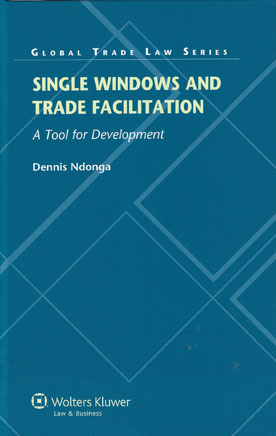Single Windows and Trade Facilitation
ISBN13: 9789041158345
Published: June 2015
Publisher: Kluwer Law International
Country of Publication: The Netherlands
Format: Hardback
Despatched in 11 to 13 days.
This is the first book to critically examine the correlation between Single Windows and economic development.
About Single Windows
The Single Windows electronic environment, introduced as part of the World Trade Organization’s Agreement on Trade Facilitation (ATF) in December 2013, promises to bring meaningful gains to all parties involved in cross-border commerce. The main value proposition for having a single window for a country or economy is to increase the efficiency through time and cost savings for traders in their dealings with government authorities for obtaining the relevant clearance and permit(s) for moving cargoes across national or economic borders. However, a common view in developing countries is that the system’s implementation costs far outweigh its presumed (and questionable) benefits.
How this book can help
The author analyses key challenges facing the adoption of Single Windows, and provides you with well-thought-out direction to help developing countries preparing to enforce the relevant provisions of the ATF. He sets out his views as to how trade facilitation, especially in its Single Windows guise, can enable the internal constraints of developing countries.
Comprehensive coverage includes:
- How Single Windows increases developing countries’ competitiveness in attracting export-oriented investors;
- How Single Windows plugs administrative loopholes that allow corruption to thrive;
- How Single Windows promotes efficiency in transmission of documents, border tax collection, and service delivery;
- Overcoming digital divide barriers and technological challenges;
- The crucial role of technical assistance and capacity building (TACB);
- The technological benefits of e-governance diffusion into an economy;
- Mitigating the protectionist policies exercised by developed countries;
- Legal concerns over electronically authenticated documents; and
- Managing Single Windows implementation and operational costs.
You’ll find clear advice as to how the adoption of Single Windows can improve the quality of business and administrative decision making, and promote economic development. The author looks at the importance of Single Windows as a trade facilitative tool, and discusses e-government initiatives. He explores Single Windows as a tool to combat corruption in customs, and how to attract foreign investment through Single Windows implementation. The work explores the technological challenges to Single Window implementation in developing countries, and looks at the legal effectiveness of electronic trade documents. This work will be of interest to policy makers and anyone involved in trade facilitation who needs to know more about how Single Windows can help them.
